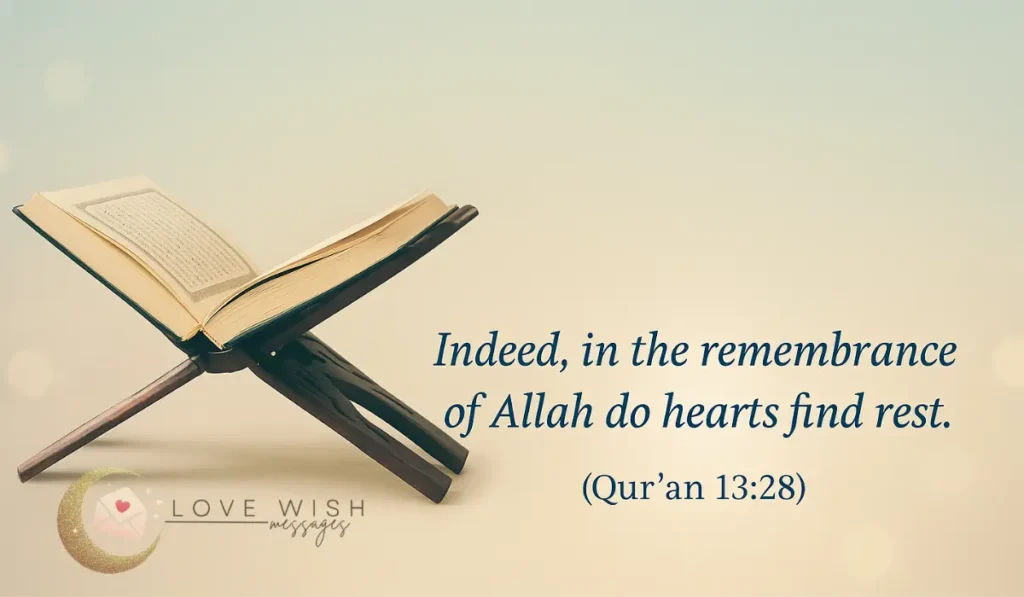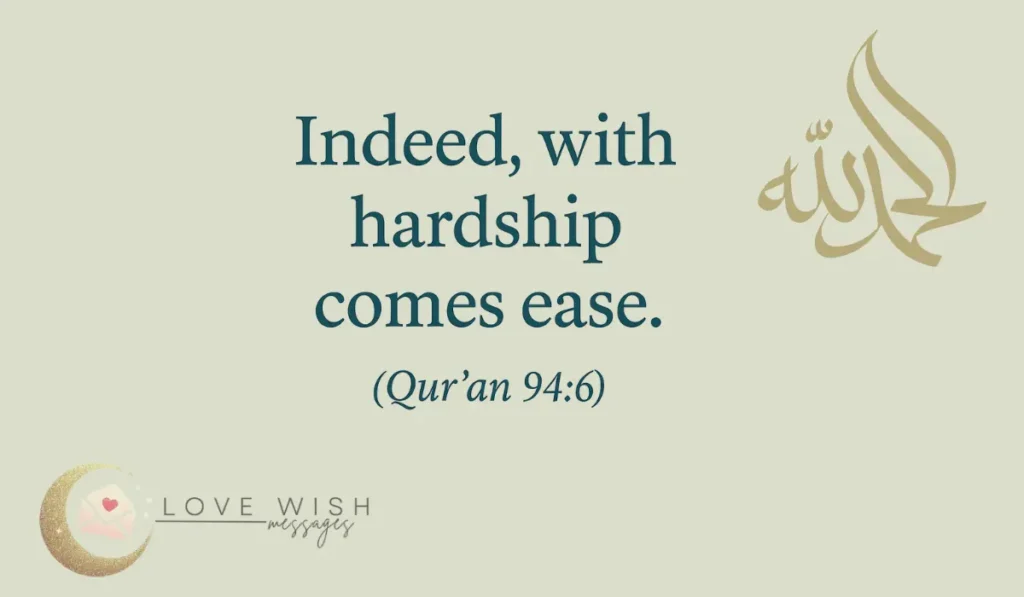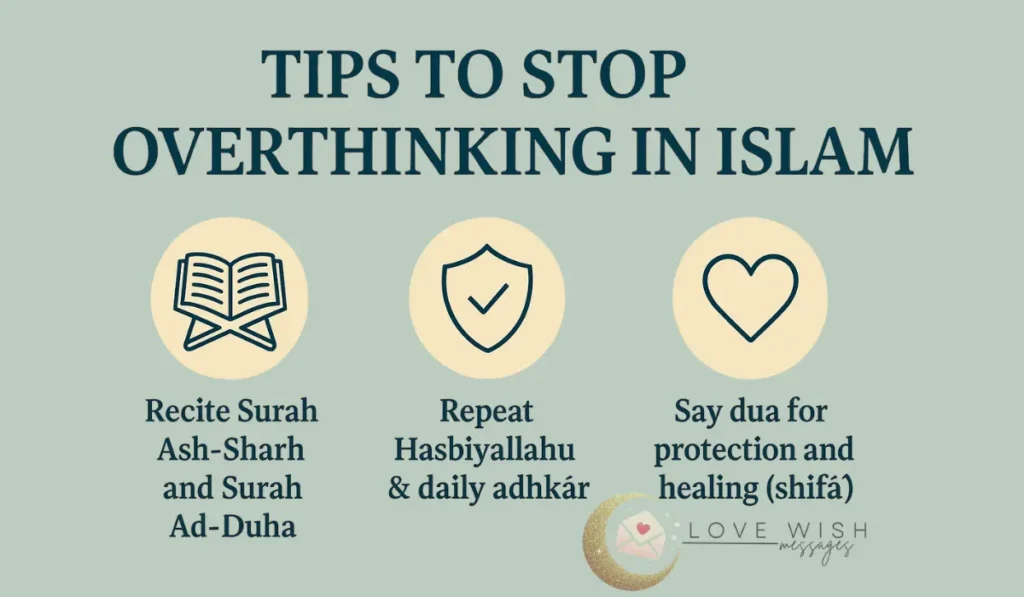The Silent Burden of Overthinking

Dua for Anxiety and Overthinking is needed because overthinking is one of the quiet tests of life. A person may sit in silence, yet inside the heart is unsettled. Thoughts repeat. Worries grow. What happened yesterday comes back again and again, and what has not yet happened feels heavier than it should.
Many believers go through this without speaking of it. Nights become long, and sleep feels far away. Days pass with the body present but the mind absent. This is not weakness. It is part of being human. Even the Prophets, peace be upon them, asked Allāh for strength in times of fear and sadness.
Allāh says in the Qur’an:
“Indeed, in the remembrance of Allāh do hearts find rest.”
(Surah Ar-Ra’d, 13:28)
When thoughts are too loud, the solution is not to think more. The solution is to remember Allāh, to call upon Him, and to hand over the burden.
The Prophet ﷺ did not leave us without guidance. He taught specific words to say when grief or anxiety grew heavy. In the next section, we will look at one of the most important supplications for such moments, reminding us that dua for anxiety and overthinking is the believer’s greatest shield.
What the Prophet ﷺ Taught About Dua for Anxiety and Overthinking
The Prophet Muhammad ﷺ experienced worry and hardship, yet he showed us how to turn every moment of distress into a prayer. His teachings include specific dua for anxiety and overthinking, which Muslims can recite when the heart feels unsettled.
One of the most powerful supplications is:
اللَّهُمَّ إِنِّي أَعُوذُ بِكَ مِنَ الْهَمِّ وَالْحَزَنِ
Allāhumma innī a‘ūdhu bika minal-hammi wal-ḥazan
(O Allāh, I seek refuge in You from anxiety and grief.)

This short dua covers two struggles: the pain of the past (ḥazan – grief) and the fear of the future (hamm – anxiety). Overthinking often lives in these two places. The Prophet ﷺ taught this dua so that a believer can hand over both to Allāh, trusting His wisdom.
Another dua from the Sunnah is:
حَسْبِيَ اللَّهُ لاَ إِلَهَ إِلاَّ هُوَ
Hasbiyallāhu lā ilāha illā Huwa
(Allāh is sufficient for me; there is no deity except Him.)
When recited with sincerity, this remembrance removes the feeling of being overwhelmed. It reminds the heart that nothing happens except by the will of Allāh, and that relying on Him brings true strength.
These duas are not only words. They are a way of training the heart to stop overthinking and to find rest in tawakkul, complete trust in Allāh.
Quranic Verses for Anxiety and Overthinking
The Qur’an is a cure for the heart. Allāh says:
“And We send down of the Qur’an that which is a healing and a mercy to those who believe.”
(Surah Al-Isra, 17:82)
When the mind feels restless, Qur’anic verses bring peace just like a dua for anxiety and overthinking. They remind the believer that every burden has relief, and every worry has a solution through the remembrance of Allāh.
Surah Al-Fatiha for Inner Peace
Al-Fatiha is a complete prayer. It asks Allāh for guidance and protection from being lost. Reciting it with focus helps calm fear and keeps the heart connected to Allāh.
Ayat al-Kursi for Protection from Fear
The verse of the Throne (2:255) is recited for safety and protection. Many Muslims read it before sleeping to ease overthinking and to protect the heart from unseen worries.
Surah Al-Inshirah for Relief from Hardship
Allāh repeats the words: “Indeed, with hardship comes ease” (94:5–6). These verses remind us that every difficulty, including anxiety, is followed by relief. Overthinking should not make us hopeless, for ease is always near.

Surah Ar-Ra’d for Tranquility
Allāh says: “Indeed, in the remembrance of Allāh do hearts find rest.” (13:28). This verse is central for anyone seeking comfort. Reciting it during stress reinforces the truth that the heart finds peace only with Allāh.
By combining these Qur’anic verses with daily dua for anxiety and overthinking, a believer strengthens both the mind and the soul.
Best Dua for Anxiety and Overthinking with Meaning
When life feels overwhelming, the heart finds comfort in dua for anxiety and overthinking. The Prophet ﷺ himself taught short but powerful supplications that bring peace. These duas are simple to learn, easy to recite, and full of meaning.
Dua for Anxiety and Grief
اللَّهُمَّ إِنِّي أَعُوذُ بِكَ مِنَ الْهَمِّ وَالْحَزَنِ
Allāhumma innī a‘ūdhu bika minal-hammi wal-ḥazan
(O Allāh, I seek refuge in You from anxiety and grief.)
This dua was taught by the Prophet ﷺ as protection from the burden of grief and the worry of the future. It is a central dua for anxiety and overthinking, reminding us that both past pain and future fears can be lifted only by Allāh.
(Reference: Sahih Hadith on Sunnah.com)
Dua for Peace of Mind and Reliance on Allah
حَسْبِيَ اللَّهُ لاَ إِلَهَ إِلاَّ هُوَ
Hasbiyallāhu lā ilāha illā Huwa
(Allāh is sufficient for me; there is no deity except Him.)
This is among the most well-known duas for anxiety. It is often repeated when fear or stress rises, and it strengthens tawakkul (trust in Allāh).
Dua for Stress and Overthinking
Another helpful supplication is:
اللَّهُمَّ رحمتَكَ أرجو فلا تَكِلني إلى نفسي طرفةَ عينٍ
Allāhumma raḥmataka arjū fa-lā takilnī ilā nafsī ṭarfata ʿayn
(O Allāh, I hope for Your mercy, so do not leave me to myself even for the blink of an eye.)
This dua protects against falling deeper into overthinking and reminds the believer that peace only comes through Allāh’s mercy.
Practical Advice for Using These Duas
- Recite them in sujūd (prostration) during prayer.
- Repeat them in the morning and evening adhkār.
- Use them as daily remembrance alongside Qur’anic verses.
For a broader collection of supplications for protection, see our guide on the Manzil Dua: Meaning & Benefits.
Also, if you are struggling with motivation in your daily life, reading Islamic Motivational Quotes: Faith, Strength & Success can uplift the heart.
Together, these practices help manage both the spiritual and emotional side of anxiety.
Tips to Stop Overthinking in Islam

Islam offers guidance not only through dua for anxiety and overthinking but also through Qur’an, dhikr, and prophetic teachings that help a believer manage constant worry. Each of the following steps can be practiced daily to calm the mind and heart.
Dua for Anxiety and Stress
The Prophet ﷺ taught us to seek refuge in Allāh from both sadness and worry. Reciting dua for anxiety and stress each morning and night is a way to hand over heavy thoughts to Allāh. It reminds the believer that life’s outcomes are never in our control, but always in His mercy.
Dua Anxiety for Daily Calmness
Repeating dua anxiety throughout the day is a simple habit that keeps the heart steady. Each time a wave of overthinking arrives, replace it with this supplication. Over time, the heart learns to rely more on remembrance than on restless thoughts.
Surah for Anxiety and Relief
The Qur’an itself is a cure. Reciting a surah for anxiety such as Surah Al-Inshirah or Surah Ad-Duha reminds us that after every hardship, relief is guaranteed. Reflecting on these verses builds hope and weakens the cycle of overthinking.
Dua for Protection from Fear
Fear often feeds anxious thoughts. Saying a dua for protection when stepping out of the home or before facing challenges helps the believer feel secure. It strengthens the belief that no harm can touch us except by Allāh’s will.
For more protection-related supplications, you can read the Dua to Go for Hajj and Umrah, which includes duas for safe journeys and divine care.
Dua for Shifa in Times of Anxiety
When overthinking affects both body and spirit, it is important to ask Allāh through dua for shifa. This prayer acknowledges Allāh as Ash-Shāfi (the Healer) and asks Him to bring complete healing to the believer.
Dua Against Depression and Sadness
Anxiety can sometimes grow into sadness. Reciting a dua against depression or a dua for sadness is a way of asking Allāh to lift darkness from the heart. These supplications bring hope when despair tries to settle.
For uplifting reminders that inspire faith and optimism, see May Allah Bless You with Endless Happiness and Success.

Trusting Allah to End Overthinking
At its root, overthinking comes from forgetting tawakkul. By making dua for anxiety and overthinking with sincerity and repeating Qur’anic verses, the believer learns to trust that Allāh controls every matter. This trust quiets the mind and allows the heart to rest in His care.
Final Thoughts and Encouragement
Overthinking and anxiety are among the hidden struggles of modern life, but Islam provides both spiritual and practical remedies. Reciting dua for anxiety and overthinking brings the believer back to Allāh, the only One who can replace fear with peace.
It is important to remember that these struggles are tests, not punishments. Allāh promises in the Qur’an that with every hardship comes ease. By reciting dua for sadness, reflecting on a surah for anxiety, or repeating dhikr in quiet moments, the believer strengthens their connection to Allāh and finds comfort in His remembrance.
Each step you take toward remembering Allāh is a step away from anxiety. Be patient, be hopeful, and keep your heart attached to the mercy of your Lord.
For reminders about the virtue of patience, you can read 459+ Islamic Quotes for Patience & Silence. And to discover more duas, quotes, and blessings for every part of life, visit LoveWishesMsg.
FAQs on Dua for Anxiety and Overthinking
What is the best dua for anxiety and overthinking?
The Prophet ﷺ taught:
اللَّهُمَّ إِنِّي أَعُوذُ بِكَ مِنَ الْهَمِّ وَالْحَزَنِ
(Allāhumma innī aʿūdhu bika minal-hammi wal-ḥazan)
“O Allāh, I seek refuge in You from anxiety and grief.”
This is one of the most direct supplications for removing heavy thoughts and sadness.
Which surah helps with anxiety and stress?
Muslims often recite Surah Al-Inshirah and Surah Ad-Duha as a surah for anxiety. These chapters remind us that ease always follows hardship, giving hope during stressful times.
Can dua remove depression and sadness?
Yes. Islam provides dua against depression and dua for sadness, which lighten the heart. While dua brings spiritual healing, combining it with patience (sabr) strengthens recovery.
How should I use dua anxiety in daily life?
You can repeat dua anxiety in sujūd, after prayer, and in your morning and evening adhkār. Consistency makes the heart stronger against worry.
Is there a dua for protection during overthinking?
Yes. The Sunnah includes dua for protection when leaving home or facing uncertainty. Reciting it increases tawakkul (trust in Allāh) and shields the heart from fear.

